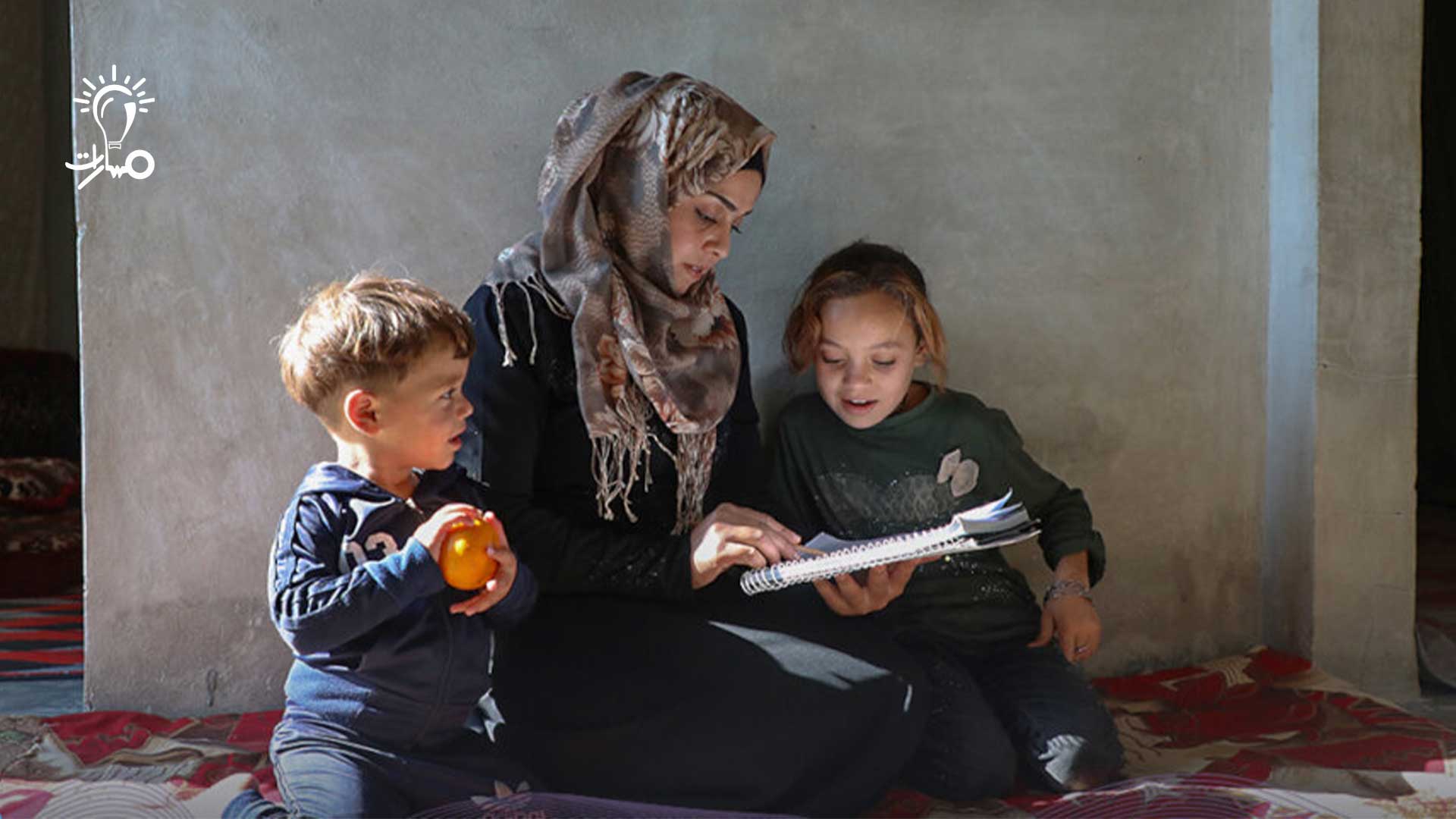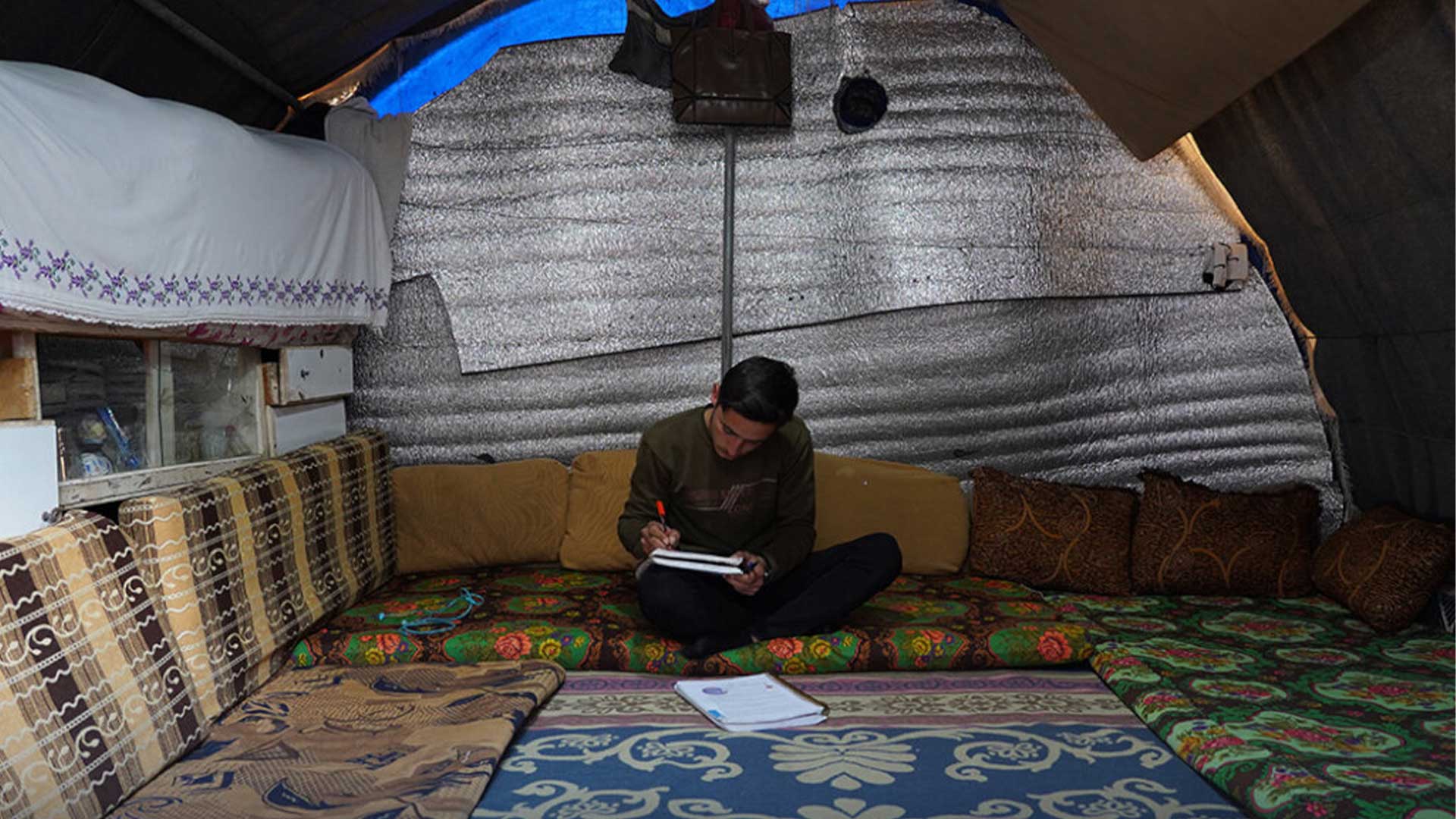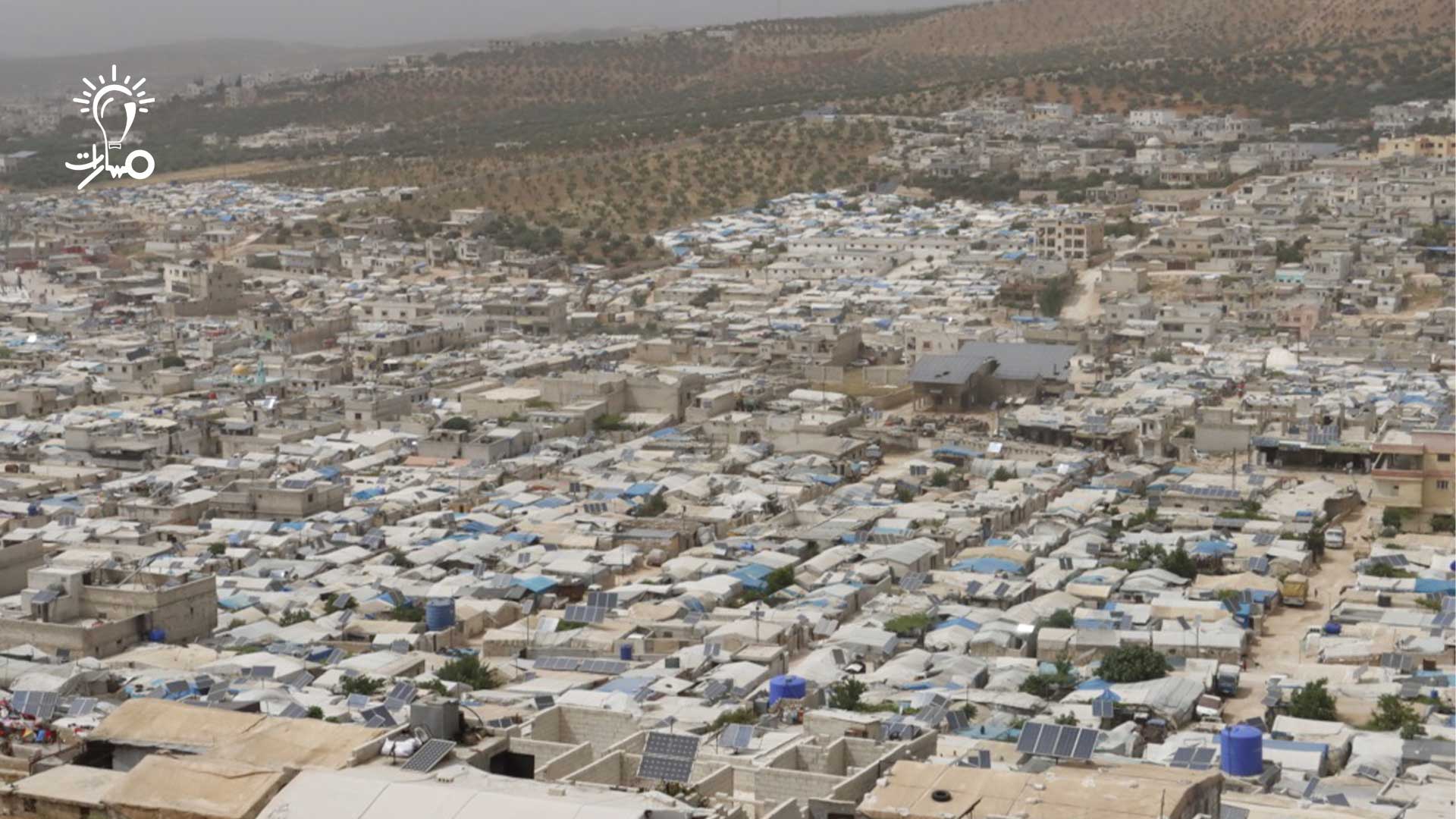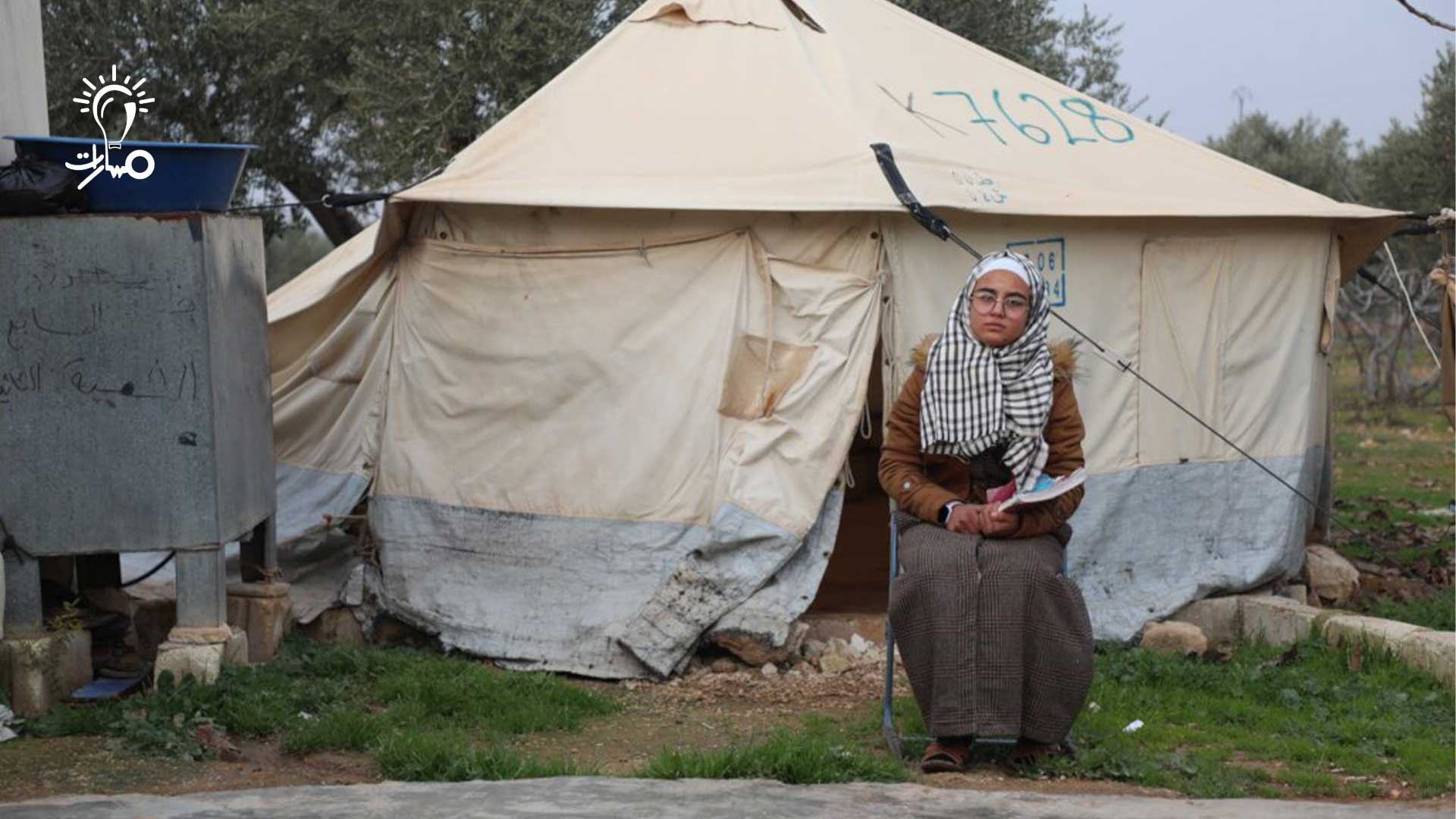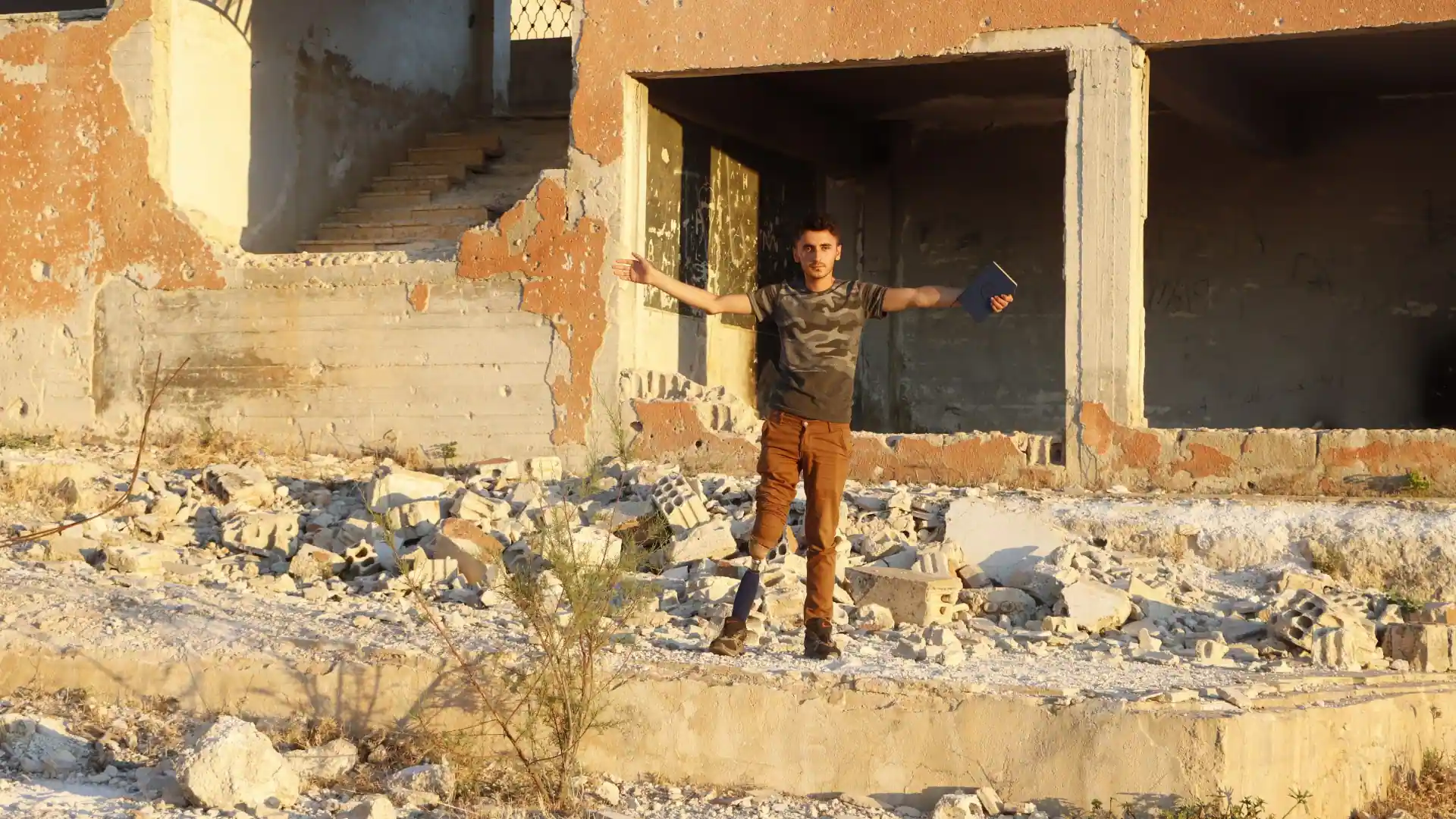In the dark corners of his memory, clouded by the shadows of war and loss, “Ahmed” holds onto a picture of his father, who was a beacon of light in the dark nights of his city, Maarat al-Numan. His father always encouraged him to pursue education and knowledge, as a lamp guiding him through the rough journey of life. However, in a moment when safety left, Ahmed also left his school benches, setting aside his books and dreams, having lost his father and provider at the tender age of ten when he needed him most.
For four years, Ahmed wandered through a maze of life, between losing hope, the hardships of displacement, and financial struggles. Those days were as dark as the nights of his abandoned city, where he lost the support and backing needed to continue his education with the loss of his father, his pillar of support.
Yet, in the depths of his heart, burdened with sorrow, his father’s voice echoed, reminding him of the importance of education and learning. Thus, after five lean years, Ahmed stood at the doorstep of Masarat initiative, having heard that it offers online education. He promptly registered, where Masarat provided him with the opportunity for online education, completely free and effortlessly, without the burdens of commuting or financial worry.
With determination and resolve, Ahmed vowed to himself and his father’s pure soul to continue on the path of education, unceasingly and unwaveringly, and he charted a roadmap towards the future, armed with knowledge, defying all obstacles.
Today, he dreams of becoming a beacon illuminating the path of success and excellence for other orphans, continuing the journey his father started.
The Merit and Importance of Caring for and Educating Orphans in Islam
In a world full of challenges and changes, an orphan stands like a small tree in the midst of a harsh desert, searching for water and light to grow and flourish. Caring for orphans is not just an act of charity but building the foundation of a strong and cohesive society. It is a journey of love and giving, planting hope in little hearts that harbor big dreams.
This innocent child, who has lost warmth and security, needs a hand extended in love and care. The merit of caring for orphans extends not only to the child but also impacts the whole community. It means giving them the chance to grow and develop healthily to become active and contributing members in the future, preserving security and achieving peace.
The Merit of Educating Orphans
Did you know that educating orphans is like water to a thirsty flower? It opens doors of hope and gives them the strength to face life’s challenges. It provides them with the tools to build their future with their own hands, enabling them to dream and strive to achieve those dreams. It creates an educated generation capable of thinking and innovating, thus advancing society.
When a believer sponsors an orphan, they remember that the Prophet Muhammad, peace be upon him, experienced orphanhood just like them, and he commanded not to oppress them (Qur’an 93:6-9). It is a comfort to the orphans and an incentive for their sponsors that they are caring for someone who lived their childhood like the Prophet Muhammad, peace be upon him, so they should not harm them but rather provide them with support for their right to education and a decent life.
Allah Almighty says, “And that you stand firm for the orphans with justice” (Qur’an 4:127). This urges Muslims to care for orphans, protect their properties, nurture their upbringing and education, and ensure a fair and just environment for them, warning against injustice or mistreatment.
Abu Umamah al-Bahili reported that the Prophet of Allah, peace be upon him, said: “Whoever strokes the head of an orphan, not but for Allah’s sake, will have blessings for every hair his hand passes over, and whoever treats an orphan girl or boy well under his care, I and he will be in Paradise like these two,” and he indicated with his forefinger and middle finger.
Abu Huraira reported that a man complained to the Prophet of Allah, peace be upon him, about the hardness of his heart. The Prophet told him, “If you want your heart to soften, feed the needy and stroke the orphan’s head.” This was reported by Ahmad and authenticated by Al-Albani.
How Can We Contribute to the Care and Education of Orphans?
Amidst war and instability in northwest Syria, the educational process faces significant challenges and difficulties, especially for orphaned children who have lost their primary caregivers and providers. From the heart of this suffering and others, Masarat initiative was born to offer online education as a solution to student dropout and discontinuation of studies, with particular attention to orphan students, by:
Providing a suitable educational environment: We offer education to them for free, providing a safe and motivating environment without the burdens of commuting and its difficulties under harsh and unsafe conditions, along with supplying them, as much as possible, with school necessities like books and stationery.
Personal care and guidance: Personal supervision and guidance for orphans in their educational journey. This includes offering career advice and helping them make important decisions related to their educational and professional futures.
Offering additional educational opportunities: Encouraging orphans to participate in additional educational activities such as training courses, workshops, and summer educational programs that can enhance their skills and knowledge.
Encouraging self-learning: Motivating orphans to learn independently and explore their areas of interest. This can be done by providing books, access to online educational resources, and encouraging them to participate in extracurricular educational activities.
Psychological and social support: Providing psychological and social support to orphans to help them overcome challenges they may face in their educational journey, including listening to their problems, offering advice, and building a supportive relationship with them.
Our Duty Towards Orphans
The humanitarian work of caring for and sponsoring orphans, especially in the field of education, is a fundamental part of a Muslim believer’s responsibilities. This responsibility is viewed not just as a religious duty but also as part of Islamic ethics and its commitment towards Muslims.
Achieving social balance by caring for orphans and providing them with sufficient support contributes to building a balanced society that nurtures the rights of all its members, including the most vulnerable, and developing future generations through investing in the education and care for orphans ensures raising a generation capable of effectively contributing to society.
In addition, caring for orphans enhances the values of benevolence and social solidarity. These values are not limited to providing material assistance but also include emotional, psychological, and social care, strengthening community bonds where individuals feel they are part of a supportive network that cares for all its members.
In Islam, there is a significant emphasis on the reward and blessing obtained by those who care for orphans. These acts are seen as a means to earn Allah’s favor and draw closer to Him.
In conclusion, we must remember that every orphan has an untold story, an unrealized dream, and a future waiting to be written. Caring for and educating them is a bridge towards that future. It is a call for every heart beating with love and generosity to be part of this noble and lofty journey, to extend our hands and hearts to these orphaned children. Each time we help an orphan, we add a glimmer of hope to our world filled with darkness.
Imagine for a moment that you can be part of Ahmed’s story and many others like it, contributing to transforming an orphan’s life from darkness to light, from despair to hope. It is a call for you to make your assistance and support a bridge for these children to cross towards a bright future dominated by knowledge and learning. Your support is not just a material contribution; it is an investment in the future of an entire generation.
Author: Mr. Fouad Al-Dik, Director of Human Resources at Masarat Initiative


